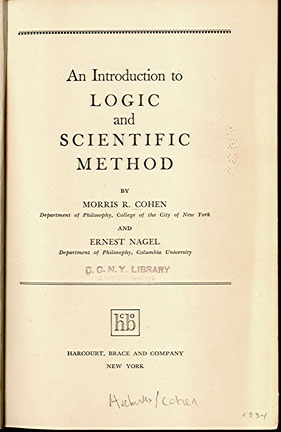Morris R. Cohen in Retrospect
By Ernest Nagel
Cohen himself confessed that he never felt quite at home
in even the grandest intellectual mansions which philosophers
have been constructing for several millennia. He found no
evidence whatsoever for the frequently made assumption that
the universe is a unitary process, or even a closely knit
pattern of different processes, which conforms to the categorical
schemata of any of the past of current philosophical systems.
He rejected as utterly provincial attempts to map the contours
of existence in terms of anthropomorphic notions, which pretend
to find a likeness to human characteristics in all areas of
nature And while he saw no inevitable progress in the events
of human history, he found no cause either for lachrymose
agonizing or for romantic postures of defiance, in the fact
that the cosmos is not especially arranged for the furtherance
of human aims.
Cohen was therefore no philosophical system builder in the
grand manner. But to my mind he was something much more valuable.
He was a man with an almost insatiable intellectual curiosity,
highly sensitive to the variety of colored strands with which
the web of existence is woven, and possessing an extraordinarily
acute critical faculty for exploding the pretentious shams
of our society as well as of the intellectual life. He liked
to refer to himself as being primarily a logician. But he
prepared himself for the function he believed a philosopher
should exercise, not only by learning the conventional skills
of the logician's craft, but also by acquiring unusual mastery
over a tremendous range of disciplines and materials. He had
a consuming interest in both the natural and the social sciences,
in logical theory as well as in history, in mathematics and
also in law and social philosophy. In consequence, philosophy
as practiced by Cohen was a ancient credos to win assent for
ideas foreign to the accepted meanings of the terms used.
Cohen was a genuine liberal, in matters intellectual as well
as political. He stressed the importance of exploring in a
responsible manner untried possibilities, alternative to those
realized in actual beliefs and actions; and he accepted as
part of his own outlook Justice Holmes's dictum "To have
doubted one's own first principles is the mark of a civilized
man." But Cohen's liberalism was not a spineless eclecticism,
which refuses to take a stand on any issue on the specious
ground that since every distinct perspective reveals something
not visible in another, no perspective whatsoever can be rightfully
adopted. The absolute and total truth is a matter that may
be of concern to an Infinite Intelligence; but it was part
of Cohen's wisdom to be gladly reconciled to our actual human
finitude, and to accept therefore without demurrer the incomplete
yet frequently adequate character of the knowledge of things
we may achieve. Cohen's liberalism was the liberalism of a
critical sanity, which was undismayed by the clamors of the
market place. He was a knight errant in the cause of human
enlightenment, and on behalf of the ideal of beliefs clearly
formulated and rationally established. It is an ideal from
which men often turn away, but it is also one to which many
men frequently return. It is his service to this ideal which
keeps Cohen's memory lustrous, and which calls forth our homage
to him. *
Columbia University.
* "An Hour of Commemoration and Song,"
January
20,1957, at the Temple Emanuel, New York City.
Earnest Nagel, "Morris R. Cohen in Retrospect,"
Journal of the History of Ideas, 18 (Oct. 1957),
pp. 548-551.
Morris R. Cohen helped to launch the Journal of the History
of Ideas in 1939. Cohen served as one of the original
editors and as a reviewer.



